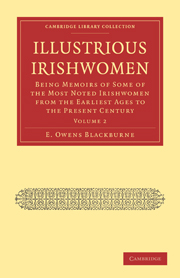 Illustrious Irishwomen
Illustrious Irishwomen THE LADY FREEMASON
Published online by Cambridge University Press: 07 September 2011
Summary
(honourable mrs.aldworth.)
born 1713.
THE Hon. Elizabeth St. Leger claims a place in the annals of noted Irishwomen, from the strange circumstances which have concurred to hand down her name to posterity. In the only portrait of her ever known to have been taken, she is represented as wearing her Masonic jewels and apron. The face is that of a woman of about five-and-thirty, with a pleasing Madonna-like cast of countenance. Benevolence and strength of character are striking features in what—considering the details we have of her life—must be a faithful likeness.
The subject of this memoir was the youngest child and only daughter of the Right Honourable Arthur St. Leger, created first Viscount Doneraile, June 23rd, 1703, and of his wife Elizabeth, the daughter and heiress of John Hayes, Esq., of Winchilsea. She was married to Richard Aldworth, Esq., of Newmarket, County Cork, who was the son of Sir Richard Aldworth, Provost Mareschal of Munster; but the date of the marriage is uncertain.
Lord Doneraile, the father of the Hon. Elizabeth St. Leger, was a zealous Freemason. He held a warrant, which empowered him occasionally to open Lodge at his own residence, Doneraile House, where, it is recorded, the duties of Freemasonry were never more rigidly performed than by the Masonic brethren of Lodge 150—the number of the warrant. In the performance of these rites, Lord Doneraile was usually assisted by his son and by some intimate friends.
- Type
- Chapter
- Information
- Illustrious IrishwomenBeing Memoirs of Some of the Most Noted Irishwomen from the Earliest Ages to the Present Century, pp. 275 - 280Publisher: Cambridge University PressPrint publication year: 2010First published in: 1877


